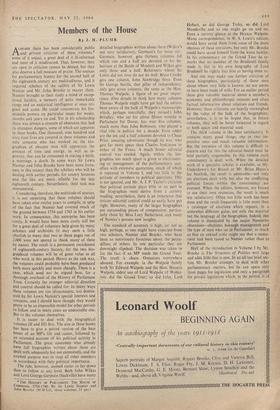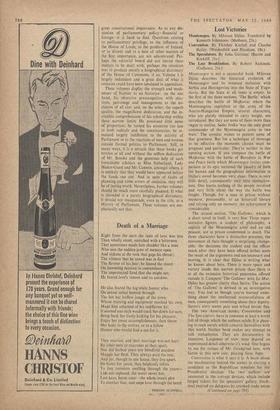Members of the House
By .1. H PLUMB
ALREADY there has been considerable public and private criticism of these volumes,* some of it unjust, a great deal of it ill-informed and most of it misdirected. That, however, they are open to criticism cannot be denied, but they also deserve a full measure of praise. The sources for parliamentary history for the second half of the eighteenth century are multitudinous, and it required scholars of the calibre of Sir Lewis Namier and Mr. John Brooke to master them. Namier brought to their study a mind of excep- tional lucidity, a memory of quite remarkable range and an analytical intelligence at once ori- ginal and acute. He could concentrate his for- midable powers on particular issues for weeks, months and years on end. Yet in his scholarship there was always a stratum of obsession that had its attendant dangers, some of which are apparent in these books. One thousand, nine hundred and sixty-four lives are covered in these volumes and. only someone who has worked on the bio- graphies of obscure men will appreciate the amount of time and energy, as well as in- genuity, that can be consumed in tracing a birth, a marriage, a death. In some ways Sir Lewis Namier and John Brooke have been more fortu- nate in this respect than the scholars who will be dealing with earlier periods, for county histories and the like are more reliable for the late eighteenth century. Nevertheless, their task was monumental.
Considering, therefore, the multitude of sources, it is not surprising that these volumes should have taken over twelve years to compile, in spite of the fact that Namier had covered much of the ground between 1754 and 1763 in his earlier work. In consequence, this enterprise has been .costly. It would have been more costly still but for a great deal of voluntary help given by many scholars and archivists (it may seem a little churlish to many that two or three pages out of 2,000 were not spared to thank many of these by name). The result is-a permanent enrichment of eighteenth-century history, for the two bio- graphical volumes will be of great value to all who work in this period. Heavy as the task was, the volumes could probably have been,produced both more quickly and more cheaply. There is a case, which need not be argued here, for a thorough overhaul of the History of Parliament Trust. Certainly far stronger editorial direction and control should be called for. In many ways these volumes are too idiosyncratic, too domin- ated by.Sir Lewis Namier's special interests and concerns, and I should have thought they would prove to be an impossible model for other periods to follow and in many cases an undesirable one. But to the volumes themselves.
It is easier to deal •with the biographical volumes (II and III) first. The aim in these books has been to give a potted version of the bare bones of an MP's life and career, followed by an extended account of his political activity in Parliament. The great statesmen who already have full biographies written about them are dealt with adequately but not extensively, and the avowed purpose was to treat all other members in accordance with their,political importance. The rule, however, seemed easier to lay down than to follow at any level. Both John Wilkes and Lord George Germain (Sackville) have many
* THE HISTORY OF PARLIAMENT. THE HOUSE OF COMMONS, 1754-1790. By Sir Lewis Namier and John Brooke (I-1.M S O., three volumes. 21 gns.l detailed biographies written about them (Wilkes's not very satisfactory, Germain's far more so): Germain, however, gets thirteen columns (of which one and a half are devoted to his be- haviour at the Battle of Minden) and Wilkes gets only three and a half. Reformers whom Sir Lewis did not love do not do well. Brass Crosby gets one column, John Sawbridge three. Even Sir George Saville, that pillar of independency, only gets seven columns, the same as the Hon. Thomas Walpole, a figure of no great impor- tance. (One dreads to think how many columns Thomas Walpole might have got had the editors been aware of the bulk of Walpole's manuscripts which, perhaps mercifully, they missed.) John Brindley, who sat for about fifteen months in Parliament for Dover, has over five columns, much more than John Robinson, who played a vital role in politics for a decade. Even odder are the ten and a half columns devoted to Chase Price, amusing adventurer though he was, who gets far more space than Charles Jenkinson or either of the Foxes. A much firmer editorial control was needed. Again, within the bio- graphies too much space is given to electioneer- ing or management of the parliamentary seal, often with extensive quotations, much of which is repeated in Volume I, and too little to the attitude of members to political questions. This is not ignored, and Mr. A. J. P. Taylor's criticism that political attitude plays little or no part in the biographies must derive from a cursory reading; nevertheless, there is an imbalance that stricter editorial control could so easily have put right. HoweVer, many of the larger biographies are outstanding pieces of compression, particu- larly those by Miss Lucy Sutherland, and many of Namier's possess new insights.
The standard of accuracy is high, yet not so high, perhaps, as one might have expected from two scholars, Namier and Brooke, who have been so notoriously ferocious about the pecca- dilloes of others. In one particular they are downright slipshod. The decision was taken to list the fact if an MP made the Grand Tour. The result is chaos. Omissions everywhere abound. For -example, in the Walpole - family both Sir Edward -Walpole and the Hon. Horatio Walpole. eldest son of Lord-WalpOle of Wolter- ton, did the Grand Tour; so did John, lord Hobart, so did George Treby, so did Lord Mandeville and so one might go on and on. Even a cursory glance at the Horace Walpole- Mann correspondence, in W. S. Lewis's edition, would have saved them from some of the more obvious of these omissions, but only Mr. Brooke could have saved himself from the worst howler. In his commentary on the Grand Tour he re- marks that no member of the Brudenell family made it, but in his own biography of Lord Brudenell he rightly lists him as having done so.
And one may make one further criticism of these biographies, particularly of those men about whom very little is known: no use seems to have been made of wills. For an earlier period these give valuable material about a member's economic and philanthropic interests and often factual information about relatives and friends. However, these criticisms are heavily outweighed by the value of the bulk of the biographies; nevertheless, it is to be hoped that, in future volumes, they will be better balanced in regard to both space and material used.
The third volume is the least satisfactory. It contains many good things, one or two im- pressive ones and much valuable information. But the intention of this volume is difficult to discern and for this the editorial board must be held partially responsible. In this volume each constituency is dealt with. When the detailed work of a specialist scholar is available, as Mr. Underdown's for Bristol or Mr. Brian Hayes's for Norfolk, the result is admirable—not only are elections dealt with, but also the conflicting political forces within the constituency are assessed. When the editors, however, are forced to use their own resources, the result is much less satisfactory. Often too little work has been done and the result frequently is little more than a catalogue of elections which repeats, in a somewhat different guise, not only the material but the language of the biographies. Indeed, this volume is dominated by the major Namierite obsessions—elections, borough management and the type of men who sat in Parliament; so much so that an unkind critic might say that a monu- ment had been raised to Namier rather than to Parlfament.
Half of the introduction in Volume I by Mr. Brooke is The Structure of Politics writ large and adds little that is new. In an all too brief sec- tion Mr. Brooke attempts to deal with other parliamentary matters, but he can spare only three pages for legislation and only a paragraph for private legislatiou which, in the period, is of
great constitutional importance. As to any dis- cussion of parliamentary policy—financial or foreign—it is hard to find. Questions relating to parliamentary privilege, to the influence of the House of Lords, to the problem of Ireland, or to dissent and to a host of other matters of the first importance, are not adumbrated. Per- haps the editorial board did not intend these matters to be dealt with; perhaps the intention was to produce merely a biographical dictionary of the House of Commons; if so, Volume I is largely redundant and a great deal of what it contains could have been tabulated in appendices.
These volumes display the strength and weak- nesses of Namier as an historian: on the one hand, his obsessive preoccupation with elec- tions, patronage and management to the ex- clusion of all else; and, on the other, the superb quality, the magnificent dedication, and the in- credible comprehension of his scholarship within these narrow limits. He possessed little sense of proportion; he turned his attention too late to both radicals and the constituencies; he re- mained largely indifferent to the activity of Parliament or to the reactions of men and women outside formal politics to Parliament. Still, in many ways, it is a miracle that these books got written at all and without the selfless dedication of Mr. Brooke and the generous help of such formidable scholars as Miss Sutherland, Lady Haden-Guest and Mr. Cannon, amongst others, it is unlikely that they would have appeared before the funds ran out. And in spite of faults of planning and some errors of omission, they will be of lasting worth. Nevertheless, further volumes should be much more carefully planned. If what is intended is a purely biographical dictionary, it should not masquerade, even in the title, as a History of Parliament. These volumes are em- phatically not that.



































 Previous page
Previous page